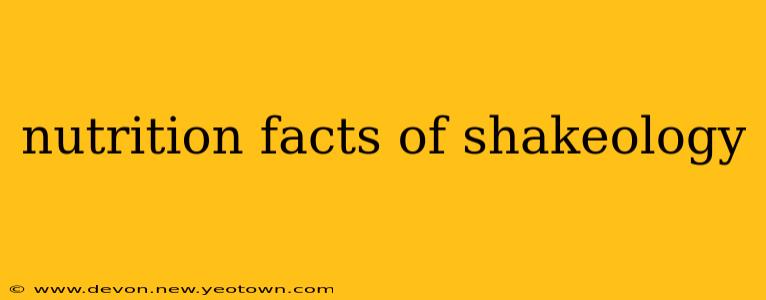Shakeology, the popular meal replacement shake, has garnered significant attention, sparking curiosity about its nutritional content. This in-depth exploration delves into the nutrition facts, addressing common questions and providing a comprehensive understanding of what's inside this popular product. We'll unravel the ingredients, highlight key nutritional aspects, and help you decide if Shakeology aligns with your health goals.
What are the main ingredients in Shakeology?
Shakeology's ingredient list varies slightly depending on the flavor, but generally features a blend of fruits, vegetables, proteins, and adaptogens. A core component is a proprietary blend of superfoods, including various fruits, vegetables, and botanical extracts designed to provide a wide spectrum of vitamins, minerals, and antioxidants. Protein sources commonly include whey protein isolate (in some formulations), soy protein isolate, and brown rice protein. Fiber is typically sourced from fruits, vegetables, and added prebiotic fibers. The exact amounts of each ingredient are not publicly disclosed, which is a point of contention for some consumers.
How many calories are in a serving of Shakeology?
The calorie count in a single serving of Shakeology typically ranges between 160 and 200 calories, depending on the flavor and whether you add any additional ingredients like milk or fruit. However, relying solely on the stated calorie count can be misleading. The nutritional value extends beyond simple caloric intake, encompassing vital micronutrients and bioactive compounds that contribute to overall health. Understanding the macronutrient breakdown – protein, carbohydrates, and fats – is just as critical as looking at the calorie count alone.
What is the protein content of Shakeology?
Shakeology boasts a significant protein content, usually around 17 grams per serving. This protein is crucial for building and repairing tissues, supporting muscle growth, and contributing to feelings of satiety. The specific type of protein used can vary depending on the formulation. While some formulations contain whey protein isolate, others prioritize plant-based options like soy and brown rice protein. Understanding the source of your protein is important if you have specific dietary needs or preferences, like avoiding dairy or soy.
Is Shakeology a good source of fiber?
Yes, Shakeology is generally a good source of dietary fiber, although the precise amount varies slightly depending on the flavor. Fiber plays a vital role in digestive health, promoting regularity and aiding in nutrient absorption. Adequate fiber intake also contributes to feelings of fullness, potentially assisting with weight management. The different sources of fiber in Shakeology (fruits, vegetables, and added prebiotics) contribute to its overall nutritional profile.
Does Shakeology contain added sugar?
While Shakeology does contain naturally occurring sugars from fruits, many formulations also contain added sugars. It’s important to check the nutrition label of your specific flavor to determine the amount of added sugar present. Monitoring added sugar intake is crucial for maintaining healthy blood sugar levels and overall well-being. The amount of added sugar is often a point of concern for health-conscious individuals, so careful consideration of the nutritional information is vital.
What are the vitamins and minerals in Shakeology?
Shakeology is fortified with a range of vitamins and minerals, aiming to provide a nutritional boost to your daily intake. The precise vitamin and mineral content varies by flavor, but it typically includes a good source of essential vitamins such as A, C, D, E, and K, as well as minerals like calcium, iron, and zinc. However, it's crucial to remember that Shakeology is a supplement, not a complete replacement for a varied and balanced diet rich in whole foods.
Is Shakeology gluten-free?
Most Shakeology flavors are marketed as gluten-free, but it’s vital to verify this information on the product packaging or the company website for your specific flavor. Always double-check ingredient lists to ensure it meets your dietary requirements. Cross-contamination during manufacturing is a potential concern, so those with severe gluten sensitivities should proceed with caution.
Is Shakeology suitable for weight loss?
While some individuals report weight loss while using Shakeology as part of a balanced diet and exercise program, it's not a magic weight-loss solution. The calorie control and nutrient-rich profile might contribute to weight management, but sustainable weight loss involves a holistic approach encompassing dietary adjustments, regular exercise, and lifestyle modifications. Shakeology, while helpful for some, shouldn't be considered a standalone weight-loss product.
Ultimately, deciding if Shakeology aligns with your nutritional needs requires a careful review of its ingredients and nutrition facts, alongside consideration of your individual health goals and dietary requirements. Always consult with a healthcare professional or registered dietitian for personalized dietary advice.

